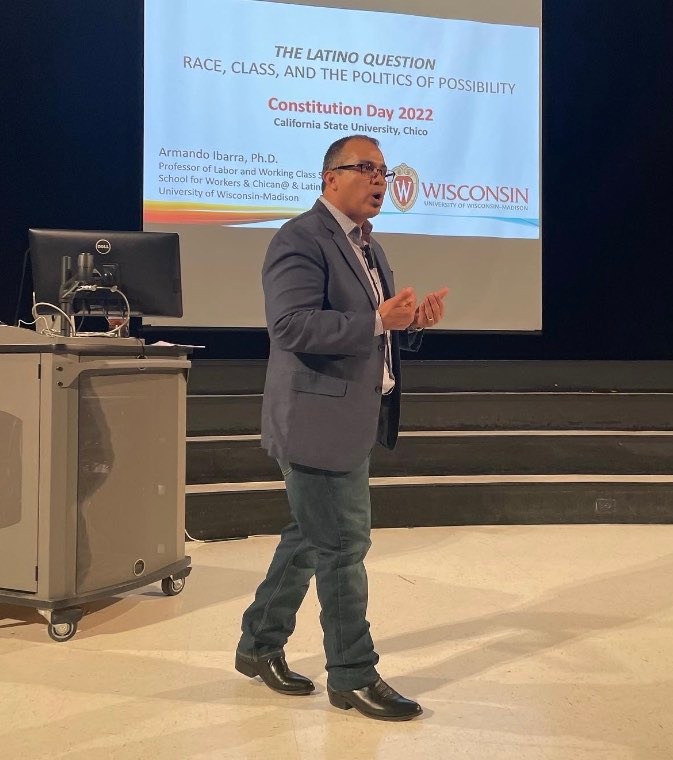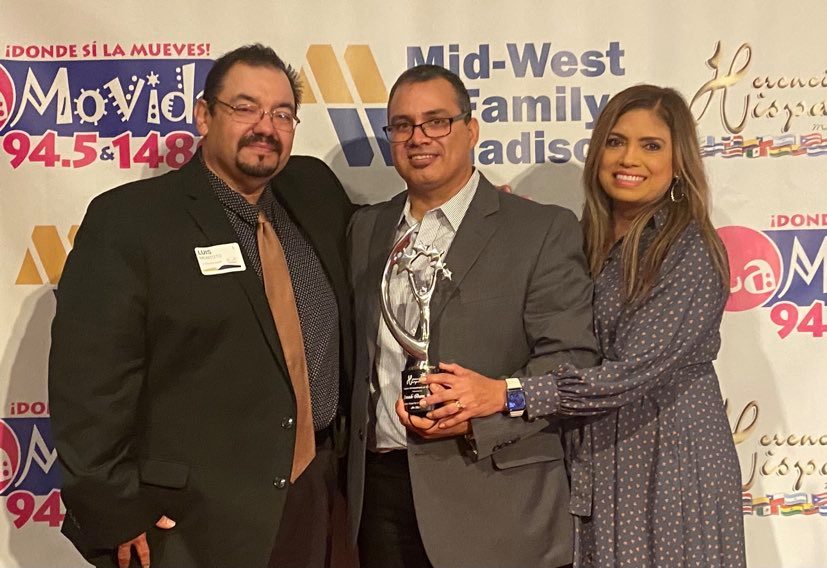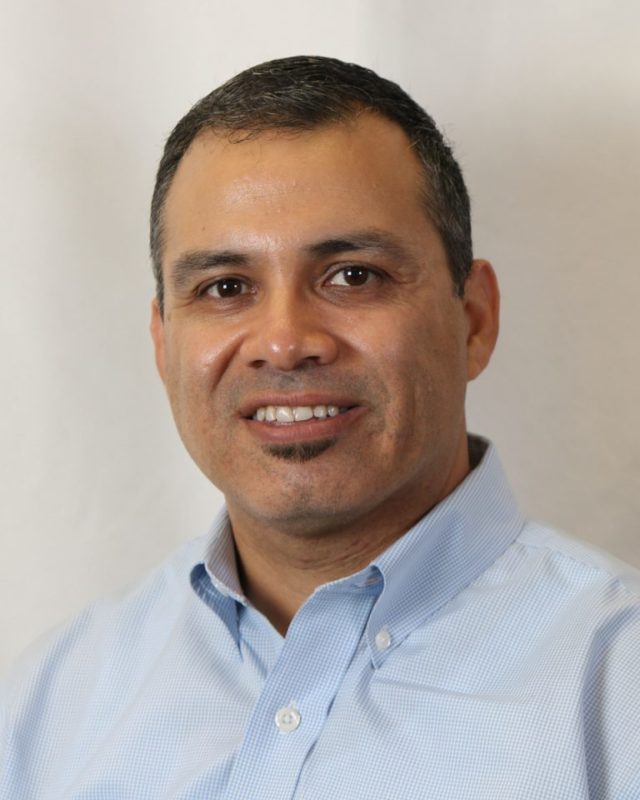Dr. Armando Ibarra, a professor in the School for Workers at the University of Wisconsin-Madison and a former director of Chican@ & Latin@ Studies, has been named a distinguished alumnus by his undergraduate alma mater, California State University, Chico.
“More than anything, I’m still kind of in disbelief right now,” Ibarra tells Madison365. “To be honored from a place that is near and dear to your heart … because it’s home …and to not expect to be honored like that, is really humbling and it’s really special.”
Considered amongst the foremost scholars in his field, Ibarra has extensive and diverse teaching, research and organizing experience. His research and fields of specialization are Chicano/a and Latino/a working communities, adult education on issues of diversity in the workplace, international labor migration, leadership development, organizing workplaces, and applied research.
Ibarra is also an accomplished author and was the lead author of “The Latino Question: Politics, Laboring Classes and the Next Left,” a 2019 Best Book in Latino Politics, which offers a cutting-edge analysis of the transformative nature of Latino politics in America.
In March, he will be traveling to his home state of California to be honored with the 2023 Distinguished Alumni of the College of Behavioral and Social Sciences. Chico State is located in the Sacramento Valley region of Northern California.
“I have difficult memories, very hard memories, but also some very powerful memories, as well,” Ibarra says of his time in college. He earned a bachelor’s degree in sociology in 1999 and a master’s degree in public administration in 2002 at California State University, Chico. “When you’re a young person growing up and being a first-generation college student and first generation to this country, there are really a lot of institutional barriers that you need to surpass to even get into college, but then there’s a whole culture of higher education that you have to learn in order to be successful.
“So all of that context really was a challenge for me as an 18-year-old wanting to learn but not really knowing how to learn because of my first-gen status,” he adds.

(Photo supplied)
It was at Chico State where Dr. Ibarra was first exposed to many wonderful and awe-inspiring cultural experiences and was on the ground floor of grassroots fights for social justice.
“I would get to see cultural events from everything like presentations on dancing, art, and music from all over the world. But it was also a place where I was exposed to social movements,” he remembers.
Prior to attending Chico State, Ibarra was a farm worker, and he continued with his agricultural labor while taking classes. That experience helped fuel his scholarship and fierce advocacy for the rights of workers.
“I kept working as a farm worker through my junior year at college, so my last day of work was in October of my junior year, and that was our harvest,” Ibarra remembers. “So I would go harvest kiwi fruit and then I would return and go to class and then do all the things that college students do, then go back to harvest in the morning.
“There were plenty of mixed emotions and facing difficult realities of uncertainty with regards to not understanding the culture of higher education and understanding the culture outside of being part of the agricultural working class in an agricultural area that was dominated by growers. So that’s how we integrated into local communities.”
It was at Chico State where Ibarra met famous labor leader and civil rights activist Cesar Chavez in the ‘90s.
“He was doing one of his final campaigns. I think it was the pesticides campaigns because of the cancer clusters around some of the fields because of the crop dusting that was being done with the pesticides,” Ibarra remembers. “It was amazing to see him and it was amazing to learn from somebody like Cesar Chavez. That was when I first engaged in movement work. I was in MEChA, a student organization, and we engaged when Prop 187 was being proposed in California, an anti-immigrant law.
“All in all, I had many wonderful memories and many difficult memories and then I had some very empowering memories from my time at Chico State,” he adds.

(Photo by A. David Dahmer)
After earning his bachelor’s and master’s degrees at Chico, Ibarra would go on to earn his Ph.D. in political science at the University of California-Irvine in 2010. Since January of 2011, Ibarra has been an associate professor at the University of Wisconsin Extension’s School for Workers, the oldest labor education program in the country. He says that his parents have had a strong influence on him and he hopes that he is impacting his own students in the same way.
“We model what we’re taught and I’ve always been taught that every person is equal in all senses. My parents have always instilled within us that equality across the board is something that is one of the most important aspects of a person’s character … to be able to see,” Ibarra says. “So I hold a deep respect for working people of all backgrounds, of all nationalities, of all races and of all ethnicities.
“I hold that deep respect for them and I want to model what I learned from my parents with regards to having those basic understandings of humanity to others.”
Ibarra has won many awards for his lifetime of work that has recognized his scholarship, work with labor rights, community impact, and family advocacy.
In 2017, Centro Hispano of Dane County honored him with the Roberto G. Sánchez Award which honors an individual, group or organization that has demonstrated leadership in advancing educational and career opportunities for Latinos. A year later, he was honored with the “Hispanic Achievement of the Year” award by Luis and Lupita Montoto at the 11th annual La Movida Hispanic Heritage Luncheon Celebration in Madison. But despite his mantle getting pretty full of awards, Ibarra still considers himself to be an outsider in many respects.

(Photo supplied.)
“I still feel like an outsider at times, even at my age and in my profession. It still feels surreal even having achieved the rank of professor at my institution where I exchange my intellectual labor for wages,” he says. “When I get awards like the [Centro Hispano] Sanchez Award or recognition as outstanding alumni, it’s humbling. We do what we do within our professions to the best of our ability, we stay true to our principles, and for many folks, staying true to your principles, it takes a toll and it takes a cost as well.
“But, hopefully, doing that will model for other young folks and young academics or whomever that you can be successful in your profession by holding true to your principles, at the same time, always having a centered understanding that we’re working toward a more just society,” he adds.
Ibarra served as program director of Chican@ & Latin@ Studies (CLS) at UW from 2018 to 2021. He currently chairs the CLS Curriculum Committee and serves the program in many other ways. He says he wants students to know that they belong here on campus just as much as anybody else and he hopes that his own personal story can be an inspiration to students who feel like an outsider on campus.
“I understand that it can be very hard. There aren’t many people that look like me that come from like backgrounds within the profession that I’m in at UW-Madison or in many of these institutions like UW-Madison across the country,” Ibarra says. “Even for us that are part of this profession that are from diverse backgrounds, it’s difficult. So if it’s difficult for us, I can only imagine what students that share similar backgrounds as I do see as students and I’m glad that I can be a resource for these students. I’m glad that I can share intellectual and academic space with students and, quite honestly, I’m glad that I can be in community with them on campus.”


































